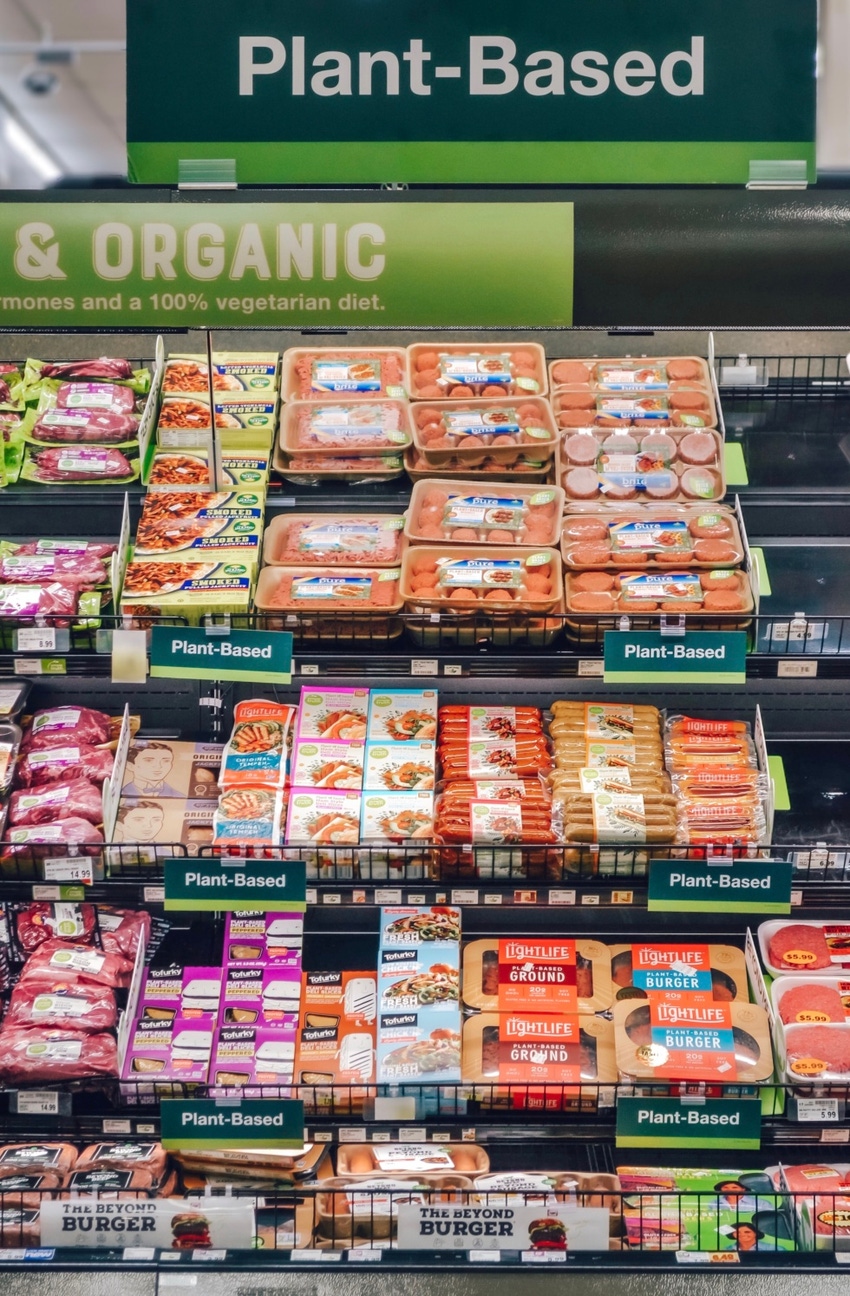Plant-based meat alternatives seeing gains, but meat sales still hold majority of market share.

The Plant Based Foods Association (PBFA), a trade association representing 170 plant-based food companies, and Kroger, the largest grocery retailer in America, found that plant-based meat sales increased by 23% when those items were sold in the meat department.
This ground-breaking study, which placed all plant-based meat in a three-foot set within the meat department, ran for 12 weeks from December 2019 through February 2020. The 60 test stores spanned three states: Colorado, Indiana, and Illinois.
In the Midwest region, where more flexitarians are emerging, plant-based meat sales were up 32% during the test period. In the Denver area, which already had a high concentration of plant-based consumers, the test also showed impressive results, with plant-based meat sales up 13%.
“This research proves that it is important for retailers to place plant-based meat where shoppers expect to find it: in the meat department,” said Julie Emmett, senior director of retail partnerships at the PBFA. “Other retailers are sure to make this change with this new data in hand.”
She continued, “The increase in sales in the Midwest demonstrates there is tremendous opportunity for plant-based meats to succeed everywhere, including in the nation’s heartland.”
Sean Brislin, merchandising director of Kroger, said the test provided one more proof point that plant-based meats have moved from niche to mainstream.
“Kroger continues to experience double-digit growth in the plant-based category, and this test demonstrates the viability of shifting product placements to reach even more customers,” he said. “We thank the Plant Based Foods Association for partnering with us on this insightful merchandising research project.”
The research included sales analysis, shopper interviews and emails, education for store personnel, and audits. The test was conducted in partnership with Kroger’s data analytics subsidiary, 84.51°.
Common interview responses from shoppers included how “excited and impressed” they were about the many options within the new set. Nearly all shoppers presumed the plant-based meats would be in the meat department near their animal-based meat counterpart, explaining that the tests made plant-based alternatives easier to find and purchase.
Current plant-based meat trends
Despite recent changes in the food industry resulting from COVID-19, the latest data from Kroger indicates that plant-based meat sales remain strong.
From March to June 2020, Kroger increased its plant-based meat customer count by more than 50% compared to last year at this time. In addition, customers purchased more often and in greater quantities than before, which led to sales growth of more than 75% during this time.
Kroger’s trends mirror the total U.S. plant-based food showing plant-based meat sales growing 61% post panic buying through the end of April.
“As plant-based meat sales continue to grow, with sales increasing even more rapidly compared to pre-pandemic levels, this research becomes even more compelling for retailers to locate plant-based meats in the meat section if they want to maximize sales by reaching more consumers,” said Michele Simon, executive director of PBFA.
Meat still king of sales
Plant-based meat alternatives, both refrigerated and frozen, experienced robust growth during the COVID-19 pandemic, although both the dollar and volume sales were only a fraction of total frozen and fresh meat sales, Anne-Marie Roerink, president of 210 Analytics, recently reported.
Since the onset of COVID-19 in early March, 210 Analytics and research firm IRI partnered to understand the total effect of grocery shopping patterns on frozen and fresh meat alternatives.
As with meat sales, meat alternative sales saw tremendous gains starting in early March, when COVID-19 upended many grocery shopping patterns. In fact, Roerink reported dollar and volume sales gains showed double-digit, year-over-year growth during the peak of COVID-19 in the U.S.
Data showed frozen plant-based meat alternatives represented the majority share of total sales. During the week ending May 24, frozen plant-based meat alternatives generated just shy of $15 million in sales versus just over $10 million for refrigerated plant-based meat alternatives. To compare, meat generated more than $1.5 billion in sales during this same week.
Roerink said refrigerated plant-based meat alternative sales have been near equal to fresh lamb sales, each generating just over $10 million in sales during the week of May 24.
However, through the pandemic, refrigerated plant-based meat alternatives have consistently outpaced their frozen counterparts in dollar and volume growth. Refrigerated alternatives were up 258% during the first of the two panic-buying weeks -- the high -- and gains have since averaged around a 120% increase versus the same week last year. Even before the COVID-19 effects in March, however, refrigerated meat alternatives were posting triple-digit increases versus the year before.
Despite the gains each week, Roerink said refrigerated meat alternative dollar sales are only a fraction of meat department sales. This, she said, means percentage gains are based on very different sales numbers and reflect very different absolute dollar gains. For instance, during the month of March, which includes the two big panic-buying weeks, meat sales totaled $6.6 billion, while plant-based meat alternatives were $112 million.
Further, the meat department has generated an additional $5.7 billion in sales since COVID-19 emerged, compared to an additional $66.6 million for refrigerated plant-based meat alternatives. In volume, an additional 1.2 billion lb. of meat and poultry were sold between March 8 and May 24 versus 7.8 million lb. of refrigerated plant-based meat alternatives.
Because of these absolute dollar gain differences, Roerink noted that the share of refrigerated plant-based meat alternatives actually dipped during the pandemic.
About the Author(s)
You May Also Like





